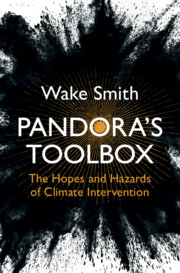Book contents
- Reviews
- Pandora’s Toolbox
- Pandora’s Toolbox
- Copyright page
- Dedication
- Contents
- Figures
- Tables
- Prologue
- Acknowledgments
- Section I Climate Introduction
- Section II Responses to Climate Change
- Section III Carbon Dioxide Removal
- Section IV Solar Radiation Management
- Section V Social Ramifications of Climate Intervention
- 16 Governance of Carbon Removal
- 17 Governance of SRM and SAI
- 18 Ethics
- 19 Public Perception
- Section VI The Path Forward
- Acronyms
- Appendix: Detail in respect of Figures 9.4–9.8
- Notes
- Index
18 - Ethics
from Section V - Social Ramifications of Climate Intervention
Published online by Cambridge University Press: 24 February 2022
- Reviews
- Pandora’s Toolbox
- Pandora’s Toolbox
- Copyright page
- Dedication
- Contents
- Figures
- Tables
- Prologue
- Acknowledgments
- Section I Climate Introduction
- Section II Responses to Climate Change
- Section III Carbon Dioxide Removal
- Section IV Solar Radiation Management
- Section V Social Ramifications of Climate Intervention
- 16 Governance of Carbon Removal
- 17 Governance of SRM and SAI
- 18 Ethics
- 19 Public Perception
- Section VI The Path Forward
- Acronyms
- Appendix: Detail in respect of Figures 9.4–9.8
- Notes
- Index
Summary
The ethics of climate change are deeply problematical – a “perfect moral storm.” This ethical terrain is characterized by a dispersal of cause and effect, a fragmentation of agency, and an institutional inadequacy. However, the greatest moral pitfall derives from the severely lagged nature of climate change, leading to dire issues of intergenerational equity. Common notions of justice in the climate arena include distributive, reparative, and procedural elements. The precautionary principle is also perceived to be a salient consideration. Ethical challenges particular to climate interventions start with the "moral hazard" or mitigation deterrence reservation as well as the risk of hubris in seeking to engineer the earth system. Some argue that geoengineering shirks responsibility for our emissions and saddles the future with a burdensome climate debt. An alternative though not universally accepted view is that since climate change is likely to have asymmetrical adverse impact on the poor, geoengineering would convey to them asymmetrical benefits. Though ethics would seem to demand not merely societal climate sacrifices but personal ones as well, few among my Yale students or Harvard colleagues have yet to undertake them. I can’t claim to be any holier than they, which is itself a dilemma.
Keywords
Information
- Type
- Chapter
- Information
- Pandora's ToolboxThe Hopes and Hazards of Climate Intervention, pp. 281 - 295Publisher: Cambridge University PressPrint publication year: 2022
